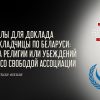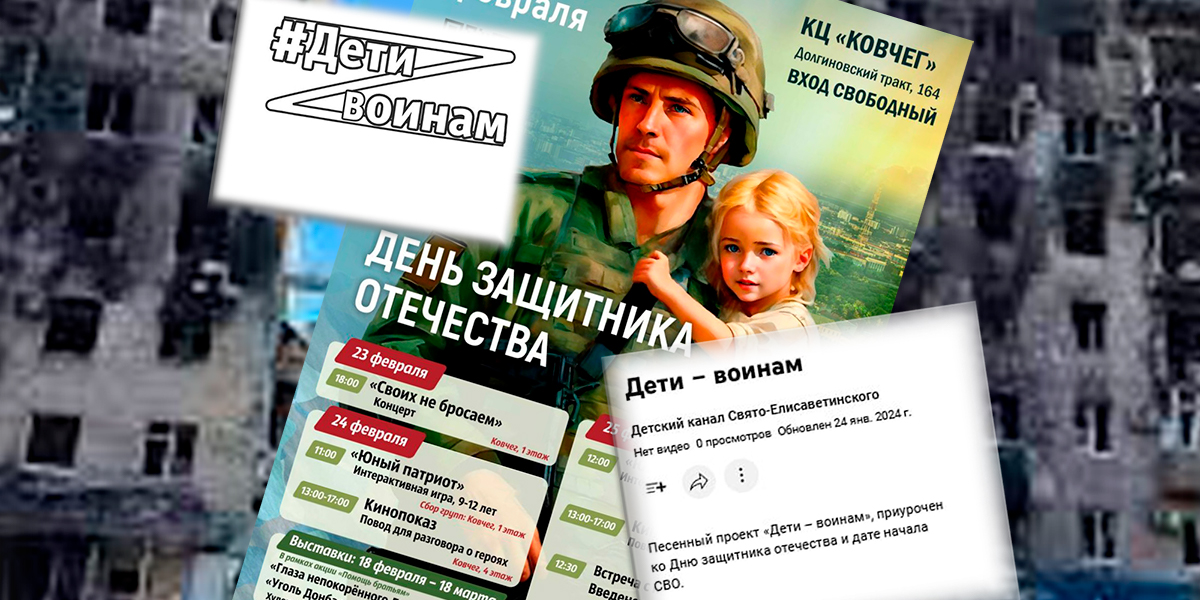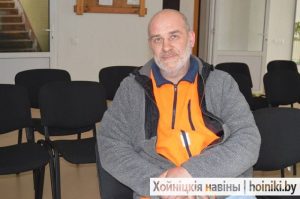Input for 2024 report of the Special Rapporteur on Belarus to the Human Rights Council: Freedom of Religion or Belief in Relation to Freedom of Association
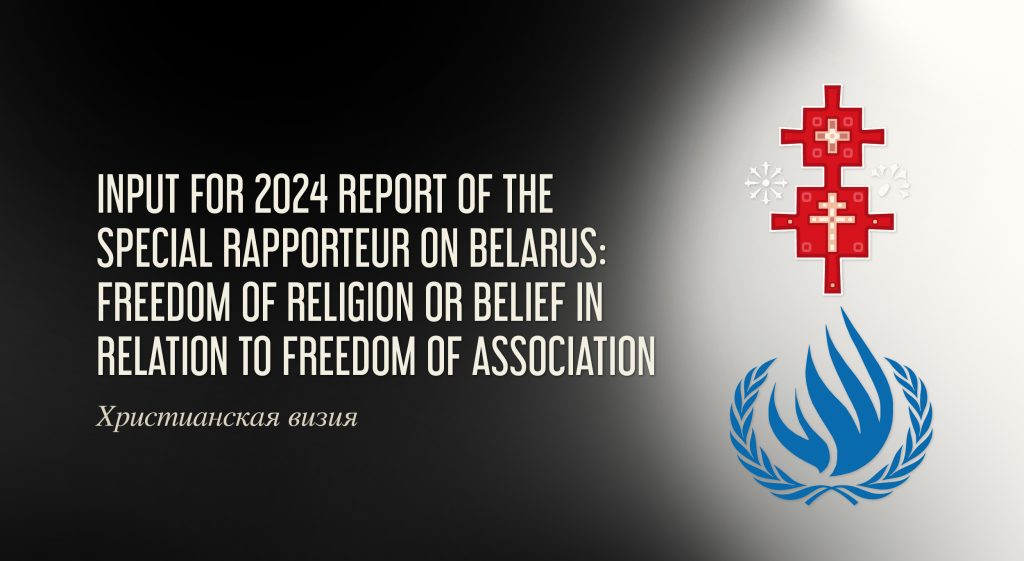
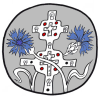
Organisation"Christian Vision"
Belarusian inter-Christian association, created during peaceful protests of 2020.
Information about the «Christian Vision». Founding statement of the «Christian Vision» Working Group. The mission of the «Christian Vision».

10 February 2024
In the following input for 2024 report of the Special Rapporteur on Belarus to the Human Rights Council, which is focused on freedom of association, Christian Vision is going to focus on restriction of the collective, communal, corporate dimension of freedom of religion or belief, which is strongly undermined by the new legislation and by restrictive and repressive measures towards religious communities and religious leaders in Belarus.
Christian Vision for Belarus is a non-governmental organisation uniting clergy, theologians and activists of the Orthodox, Roman Catholic, Greek Catholic and Evangelical churches in Belarus and abroad. It was established in September 2020 to coordinate informational, analytical, human rights, social, cultural, diplomatic, scholarly and pastoral work in the context of the deepening political crisis in Belarus, and — from February 2022 — Russian aggression against Ukraine. The Christian Vision’s aims are: the preservation of dignity and human rights in Belarus; democratic development of the country; national revival; interfaith dialogue and cooperation; stopping repressions against civil society; observing the principles of the rule of law; justice and non-discrimination; establishing a just and stable peace in the region; encouraging national dialogue and international reconciliation. One of our main areas of activities is monitoring of the situation on freedom of religion or belief in general, as well as of cases of violation of this right, persecutions and discrimination against Belarusian Christian activists and communities, advocacy and support to victims of human rights violations.1Christian Vision. About us. https://belarus2020.churchby.info/christian-vision-about-us/
Freedom of association and freedom of religion or belief are two rights which are closely intertwined, while the freedom of association is a prerequisite for the exercise of freedom of religion, and restrictions upon freedom of association result in violation of freedom of religion. Article 18 of the ICCPR protects the participation in the life of the community as the manifestation of the religion or belief of an individual member. Religious organisations are a special kind of association and serve as a conduit for exercising the right to freedom of religion or belief – in community with others.
On the one hand, international standards of human rights defend freedom of religion, and therefore, the rights of religious association even more strongly that the freedom of association in general. While according to art. 22 of the International Covenant on Civil and Political Rights, “national security” may be a legitimate ground for restriction on the freedom of association, Art. 18 of the same treaty excludes this purpose.
Concerning this the UN Human Rights Committee states in its CCPR General Comment No. 22: Article 18 (Freedom of Thought, Conscience or Religion), “that paragraph 3 of article 18 is to be strictly interpreted: restrictions are not allowed on grounds not specified there, even if they would be allowed as restrictions to other rights protected in the Covenant, such as national security” (par. 8). Siracusa Principles on the Limitation and Derogation Provisions in the International Covenant on Civil and Political Rights demand, that freedom of thought, conscience and religion shall be protected as a non-derogable right even in time of emergency threatening the life of the nation (par. 58).
On the other hand, freedom of religious association, including freedom of religious or belief communities, which do not seek to be recognised as legal persons, as well as of religious and belief organisations which seek such recognition, is protected under both Articles 18 and 22 of the ICCPR. As the European Court of Human Rights stated in its Decision in the case of Hasan and Chaush v Bulgaria (2000), if the organisation of the religious community is concerned the freedom of religion or belief must be interpreted in the light of freedom of association, “which safeguards associative life against unjustified State interference”, and “were the organisational life of the community not protected” by the freedom of religion of belief, “all other aspects of the individual’s freedom of religion would become vulnerable” (par. 62).
In Belarus a new Law on Freedom of Conscience and Religious Organisations was adopted by a Law on Amending Laws on the Issues of Activities of Religious Organisations signed by Aliaksandr Lukashenka on 30 December 2023 and published on 5 January 2024. According to this Law on Amending, the new Law on Freedom of Conscience comes into force six months after its official publication, that means, from 5 July 2024 (Art. 7). After that all religious organisations, registered before 5 July 2024, are required to undergo a process of re-registration until 5 July 2025. (Art. 4) This law in comparison with its previous version, restricts freedom of religion even in a more severe way. This was also noticed in your report as the Special Rapporteur on the situation of human rights in Belarus, together with the Special Rapporteur on the rights to freedom of peaceful assembly and of association and the Special Rapporteur on freedom of religion or belief on 28 August 2023 (OL BLR 7/2023).
Firstly, the Law demands mandatory state registration of a religious organisation as a pre-condition to operate and exercise their freedom of religion or belief (Art. 15). All activities and even the very existence outside this framework are banned (Art. 15) and criminalised (Article 193.1 of the criminal code). As stated in the Report of the then Special Rapporteur on freedom of religion or belief, Heiner Bielefeldt, a provision of Article 18, par. 1 of the ICCPR clearly includes a collective, community dimension of the freedom of religion or belief, and therefore “registration should not be compulsory, i.e. it should not be a precondition for practising one’s religion, but only for the acquisition of a legal personality status” (UN Doc.A/HRC/19/60, par. 41).
The freedom to manifest religion or belief in community belongs to individuals and therefore cannot be limited by a requirement of mandatory state registration. However, in the new law, as well as in its previous versions, communities which choose not to register, or do not meet requirements of registration, are outlawed and are at risk of criminal prosecution, which severely limits and violates both the right of the community itself and the right of its individual members to manifest their religion or belief.
Secondly, for the state registration of the religious communities, which is the only way for them to acquire legal personality, and therefore the only way to act in a legal framework, excessive demands are posed in comparison with other non-commercial organisations, which is discriminatory against religious organisations.
For non-commercial organisations of other kinds these demands are much lower. For example, to establish a “local public association” there is a minimum of ten members who are citizens of Belarus, without a requirement to live in the same locality (Art. 8 of the Law on Public Associations), while for a religious community the law demands at least twenty members who live in the same or neighbouring locality (Art. 13 of the Law on Freedom of Conscience). In the localities where fewer than twenty people of the same religious tradition are living, there is no legal possibility to register a religious community, and therefore in case of manifesting together their freedom of religion or belief are at risk of criminal prosecution.
While for a non-commercial association to create a union the law demands only two public associations without restriction on their locality (Art. 8 of the Law on Public Associations), for a religious union (association) of communities the respective law requires at least ten religious communities; for the republican union there is also a requirement that at least one of the community should have operated for a least thirty years since its state registration.
Thirdly, the law restricts individuals who are foreign citizens (Art. 13) as well as individuals who are included in the lists of organisations, formations, individual entrepreneurs and citizens involved in extremist activities (Art. 12) to be founding members and head of the religious organisations.
Differentiation between domestic and foreign nationals “as regards their ability to exercise the right to freedom of religion through participation in the life of organised religious communities” according to the ECHR’s Decision in the case Moscow Branch of the Salvation Army v. Russia (Application no. 72881/01, par. 82) has no reasonable and objective justification. Depriving foreign citizens of the right to head religious organisations, undermines not only the right of them as individuals, but also the right of the religious or belief community to freely decide itself on its leadership.
Political prisoners, who are condemned under a range of criminal articles, including art. 342 of the criminal code (“Preparation of actions which gravely violate public order”), art. 368 of the criminal code (“Insulting the President of the Republic of Belarus”) are often at risk of being included in the mention list. Both Articles 342 and 368 were contested by the Venice Commission in its Opinion No. 1016/2020 on the compatibility with European standards of certain criminal law provisions used to prosecute peaceful demonstrators and members of the “Coordination Council”.
Christian Vision has identified at least 57 believers in the current list, 2Christian Vision, “Persecution of the religious communities in Belarus through accusations of extremism”, https://belarus2020.churchby.info/persecution-of-the-religious-communities/ including one Orthodox priest (Rev. Siarhei Rezanovich), one Baptist pastor (Vitali Chychmarou), one minister of the Orthodox Church (Yauheni Hlushkou), four ministers of Protestant churches – Lidziya Ivanova (“New Testament” Evangelical church), Andrei and Vera Mamoika (“New Land” Baptist church), Maksim Stasilevich (“Gethsemane” Evangelical church). All of the mentioned persons are deprived from the right to be founding members or head of a religious organisation.
Fourthly, the area where religious communities are allowed to operate is restricted to one or several neighbouring localities, where its members are registered as residents (Art. 13). Therefore, even if a community enjoys legal status in one locality, it is outlawed when operating in another locality.
Fifthly, legal grounds to withdraw state registration and to dissolve a religious organisation were expanded in the new law, and go beyond the strict criteria of par. 3 of Article 18 of the ICCPR. Even if there are legal grounds in compliance with the demands of the article, a withdrawal of legal personality status shall be applied only as the last resort, after the violations become grave and systematic and other measures previously used, taking into consideration that the consequences of such withdrawal would have on the legal status of a religious community. As you rightly point in your report as the Special Rapporteur on the situation of human rights in Belarus, together with the Special Rapporteur on the rights to freedom of peaceful assembly and of association and the Special Rapporteur on freedom of religion or belief on 28 August 2023 (OL BLR 7/2023) with reference to the Interim report of the Special Rapporteur on freedom of religion or belief (A/73/362, par. 17), “depriving a religious or belief community of legal status can have a tremendous impact on the collective aspects of the right to freedom of religion or belief, including the ability of adherents to practice their faith together with others — jeopardizing the viability of the community itself”.
The legal grounds for dissolving a religious organisation (Art. 23) include, for example, political loyalty to the state authorities: activities which are going in contradiction with “the main directions of domestic and foreign policy”, (p.2, par.10 Art. 8), “discrediting of the Republic of Belarus” (p.3, par. 10 Art. 8), “other extremist activities” (p. 3, par. Art. 8) are forbidden.
“Discrediting of the Republic of Belarus” is a term referring to a criminal offence, prosecuted under Article 369-1 of the Criminal Code and “extremist activities” are covered by the Law on Combating Extremism, which after amendment on 14 May 2021 expanded the notion of “extremism”. Both are very controversial terms because of their broad definition which include restrictions of freedom of conscience, of expression, association, and peaceful assembly, and can be used “to curtail the right to participate in political and public life” and “to punish dissenting views”, as stated in Prof. Hervé Ascenio’s Report on the serious threat to the OSCE human dimension in Belarus since 5 November 2020 (par. 42). They are used for politically motivated repressions also against believers and religious communities.
There are several examples when political disloyalty and expressing dissenting views were the ground for dissolving or threatening to dissolve a religious organisation which were used by the authorities to arbitrarily target religious leaders and communities.
12 December 2023 the Supreme Court took a final decision on liquidation of the Full Gospel church “New Life” following recognition of some of the materials published on its media and social media as “extremist”, namely, a video entitled “Position of Christians of the New Life Church” against the political persecution, terror and violence published in 2020,3The video was deleted, but there is a full transcript of this video done by “Christian Vision”, See: https://telegra.ph/Stalo-izvestno-za-chto-materialy-cerkvi-Novaya-zhizn-hotyat-priznat-ehkstremistskimi-08-23 and a post on the church’s Instagram profile dated 17 August 2020, which contained photos of church members who stood in front of the church in a prayer chain on 16 August 2020, accompanied by a message advocating for Christians standing against violence. On 23, 25, 28 and 31 August 2023 different courts classified the church’s Instagram, the specified video on its YouTube, official website, Facebook, Telegram, VKontakte page, alongside a YouTube video titled “Pastor Viachaslau Hancharenka condemns violence and calls on the authorities to repent!” as “extremist materials”.4More see: Christian Vision, “Persecution of the religious communities in Belarus through accusations of extremism”, https://belarus2020.churchby.info/persecution-of-the-religious-communities/
Another instance is a warning no. 02-02/812 issued on 27 November 2020 by the Plenipotentiary for Religious and Ethnic Affairs to the Belarusian Orthodox Church.5More information on this: Christian Vision, “В 2020 году Уполномоченный по делам религий угрожал Белорусской Православной Церкви лишением регистрации и запретом ее деятельности”, https://belarus2020.churchby.info/v-2020-godu-upolnomochennyj-po-delam-religij-ugrozhal-belorusskoj-pravoslavnoj-czerkvi-lisheniem-registraczii-i-zapretom-ee-deyatelnosti/ In the warning it was pointed out that the Church had allegedly violated article 16 of the Constitution and Article 8 of the Law On Freedom of Conscience and Religious Organizations of the Republic of Belarus, and in accordance with Article 37 of the mentioned law, repeated violations within a year may lead to the body which registered the religious organisation to apply to the court for the liquidation of that organisation and, consequently, banning its activities in the Republic of Belarus. On 17 December 2020 this warning with instruction to fulfil the requirements was redirected by the Primate of the Belarusian Orthodox Church Metropolitan Veniamin (Tupeka) of Minsk to the late Archbishop of Hrodna Artemy (Kishchanka), who publicly spoke out several times against election fraud and violence: in a statement on 14 August 2020; in a sermon on 16 August 2020; in a sermon on Forgiveness Sunday on 14 March 2021.6Christian Vision, “Persecuted Belarusian clergy”, https://belarus2020.churchby.info/persecuted-belarusian-clergy/#Kishchenko
Following the 2020 events, the Belarusian regime started to purge the media space, identifying independent media, websites, Telegram channels, social networks, as well as symbols associated with peaceful protest, as “extremist materials.” This led to administrative prosecution under Article 19.11 of the Code of Administrative Offences, including individuals who share information from such information sources, or information that contains logos of these information sources. Websites, channels and social media accounts linked to Belarusian religious figures and communities are systematically recognised as extremist materials. Currently, the list of extremist materials includes media linked to a Roman Catholic priest Viachaslau Barok, Orthodox Archbishop of Hrodna and Vaŭkavysk Artemy (Kishchanka), a Belarusian Greek Catholic newspaper Tsarkva, Full Gospel Church New Life, Ecumenical group Christian Vision, Catholic Telegram-channel Rerum Novarum, Catholic journalist and activist Maksim Hacak, Belarusian Orthodox parish in Vilnius (Ecumenical Patriarchate), Orthodox theologian Natallia Vasilevich, anti-war ecumenical channel Christians against war!7Christian Vision, “Persecution of the religious communities in Belarus through accusations of extremism”, https://belarus2020.churchby.info/persecution-of-the-religious-communities/
Sixthly, Art. 4 of the Law on the Amending Laws on the Issues of Activities of Religious Organisations requires re-registration for all religious organisations which are already registered prior to the new Law on Freedom of Conscience entering into force. If the registered religious organisation fails to reregister, it loses its legal status even if it previously enjoyed it. Re-registration requires the same procedure as the registration of a new organisation. That means, that the new law in fact withdraws the status of a legal entity and demands to register anew.
Seventhly, religious organisations are limited in their activities and participation in public life, there is a restriction under par. 7 Article 8, which states “religious organisations are prohibited to participate in political activities”, although par. 6 Art. 8 gives to the religious organisation the right “to participate in life of society, in solving current social problems of society.” First of all, the ban of the religious organisation to participate in political activities is not legitimate. Secondly, there is no differentiation given between the participation in the “life of society” and in “political activities”, which opens the possibility to arbitrarily consider public activities of a religious organisation as political and punish them.
Eighthly, since the beginning of the current political crisis in 2020, the authorities intimidate, detain, and threaten religious leaders and their respective communities, the communities are the subject of hate-speech and defamation by state propaganda.8Christian Vision, “Defamation of believers by the authorities and propagandisits”, https://belarus2020.churchby.info/defamation-of-believers-by-the-authorities-and-propagandisits/ Since September 2020 Christian Vision identified 19 Orthodox, 25 Roman Catholic, 5 Greek Catholic, 25 Protestant priests, pastors and ministers who experienced searches, detentions, trials, arrests, criminal persecution, fines, tortures and threats.9For detailed list with description of cases see: Christian Vision, “Persecuted Belarusian Clergy”, https://belarus2020.churchby.info/persecuted-belarusian-clergy/ From the most recent cases, Volha Chamadanova, the head of the main department of ideological work and youth affairs of Minsk City Executive Committee, and in 2020, press secretary of the Ministry of Internal Affairs, speaking to the assembly of clergy of Minsk diocese on 20 December 2023 in Minsk openly threatened “ideologically alien clergy” with detention and imprisonment. According to her, over the course of a year, the authorities monitored more than 500 religious communities, in the process preventing the spread of “extremist” literature, and also revealed that in churches they prayed for Ukraine’s victory in the war.
Conclusion. The new Law on Freedom of Conscience, aimed at regulating religious activities in the Republic of Belarus, is repressive and discriminatory in nature, and does not comply with the international obligations undertaken by the Republic of Belarus to guarantee the right to freedom of religion, in particular Art. 18 of the International Covenant on Civil and Political Rights. It also severely restricts freedom of association, protected under Art. 22 of ICCPR.
The provisions of the Law are aimed at strict control, including control of the political and ideological loyalty of religious organisations that are allowed to operate in the Republic of Belarus. Other organisations, as well as persons engaged in religious activities without registration, will be at risk of prosecution, including criminal prosecution. The vagueness of such concepts as “extremist activity” and “ideology of the Belarusian state” makes it possible to arbitrarily deny registration to religious organisations, as well as to liquidate them.
The tightening of repressive measures against religious activity is a consequence of the general policy of the Belarusian regime to control civil society, ensure its loyalty and eliminate any protest or independent activity.
- 1Christian Vision. About us. https://belarus2020.churchby.info/christian-vision-about-us/
- 2Christian Vision, “Persecution of the religious communities in Belarus through accusations of extremism”, https://belarus2020.churchby.info/persecution-of-the-religious-communities/
- 3The video was deleted, but there is a full transcript of this video done by “Christian Vision”, See: https://telegra.ph/Stalo-izvestno-za-chto-materialy-cerkvi-Novaya-zhizn-hotyat-priznat-ehkstremistskimi-08-23
- 4More see: Christian Vision, “Persecution of the religious communities in Belarus through accusations of extremism”, https://belarus2020.churchby.info/persecution-of-the-religious-communities/
- 5More information on this: Christian Vision, “В 2020 году Уполномоченный по делам религий угрожал Белорусской Православной Церкви лишением регистрации и запретом ее деятельности”, https://belarus2020.churchby.info/v-2020-godu-upolnomochennyj-po-delam-religij-ugrozhal-belorusskoj-pravoslavnoj-czerkvi-lisheniem-registraczii-i-zapretom-ee-deyatelnosti/
- 6Christian Vision, “Persecuted Belarusian clergy”, https://belarus2020.churchby.info/persecuted-belarusian-clergy/#Kishchenko
- 7Christian Vision, “Persecution of the religious communities in Belarus through accusations of extremism”, https://belarus2020.churchby.info/persecution-of-the-religious-communities/
- 8Christian Vision, “Defamation of believers by the authorities and propagandisits”, https://belarus2020.churchby.info/defamation-of-believers-by-the-authorities-and-propagandisits/
- 9For detailed list with description of cases see: Christian Vision, “Persecuted Belarusian Clergy”, https://belarus2020.churchby.info/persecuted-belarusian-clergy/

